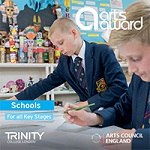
If you work in a school, whether as a leader, teacher or teaching assistant, you’ve probably already heard of Arts Award. You may be aware that thousands of other schools around the UK are already using it to help students get the most from creative and cultural activities. But did you know that Arts Award can help you meet many of your school improvement priorities, as well as your own professional development aims?
All types of schools – primary and secondary, state and independent, mainstream and specialist – use Arts Award to:
How does Arts Award work?
Arts Award is available at five levels – Discover, Explore, Bronze, Silver and Gold – so schools can offer it in every Key Stage, in any creative, cultural, media or craft activity. Discover is suitable for children from Early Years upwards, while Gold Arts Award is a Level 3 qualification worth 16 UCAS points. The five levels offer a system of progression and you can start with whichever suits your group best.
Rather than assessing a young person's skill level in a particular art form, Arts Award evaluates the personal progress they’ve made through exploring and participating in the arts. There are no entry requirements, no time limits, no exams and no rules on how candidates should present their work – video, audio, photos, web pages and PowerPoint slideshows are just as valid as written portfolios.
Some schools deliver Arts Award in arts subjects such as music, art, drama, dance, design and technology or creative writing (for college-based students, Explore, Bronze, Silver and Gold Arts Award can form part of a publicly funded 16–19 study programme). Others offer Arts Award as an extra-curricular enrichment activity, or link it to a cross-curricular project or arts event.
Getting started in schools
For more insights into how Arts Award can work in the classroom, primary school teachers can check out our online guide to how Arts Award supports the KS1 and KS2 arts curriculum containing a range of practical activity suggestions. There's also a variety of free-to-access resources on offer via our Arts Award Insight Pack - Primary.
Plus for secondary arts teachers, there's our Arts Award Insight Pack – Secondary that's full of useful digital resources, including a handy overview of the Bronze and Silver Awards, and helpful guides to support conversations with parents and senior leaders in your school.
What’s in it for schools?
Schools offering Arts Award enjoy multiple benefits: fruitful collaborations with local artists and cultural organisations; increased cross-departmental working; and improved engagement among students and their families. Arts Award can also contribute to your school achieving Artsmark status by demonstrating your ongoing commitment to the arts in the curriculum and providing accreditation for your extra-curricular arts activities.
‘From the moment I heard about Arts Award I knew it was the way arts should be taught. Being involved in Arts Award has been one of the most rewarding experiences of my teaching career.’
Christine Pearson, Arts Design & Technology Teacher, Thomas Estley Community College
What’s in it for young people?
In independent research, young people who completed Arts Award reported a positive impact on their achievement in other school subjects and said it boosted their communication skills and confidence as well as their creativity. In an era when arts subjects are facing reductions in teaching time and exam entries, it also encourages young people to study arts subjects beyond Key Stage 3. Research shows that 30% of Arts Award achievers go on to study arts subjects post-16
‘Apart from boosting my UCAS points, the skills I have developed have expanded my artistic range across several areas such as acting, directing and editing. Many of my new skills will definitely be put into practice in the future.’
Harry, Gold Award achiever, Formby High School
How do we get started?
Any staff members who want to run Arts Award at your school need to complete adviser training, either at one of our advertised online courses or as part of a group which can take place at your workplace. The online course consists of a live webinar and two independent study modules.Once your training is complete, register your school as an Arts Award centre (there is no cost for this) and you can get started.
Take a look at our Arts Award blog to get inspiration from other schools’ approaches.
| Download our Arts Award Schools leaflet for more details. |  |